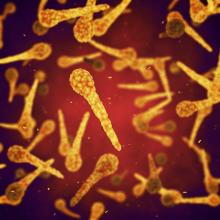Immunizations: Tetanus (Lockjaw)
Tetanus is caused by a toxin from Clostridium tetani bacteria. People also call tetanus lockjaw. That’s because it often causes muscle spasms and tightening of the jaw muscles. The bacteria make a toxin, or poison, in the body. The toxin attacks the nervous system.
Tetanus can be deadly, especially in older people and those who aren’t vaccinated.
A vaccine can prevent tetanus
The best way to prevent tetanus is to get the vaccine!
Learn more about the tetanus vaccine
About tetanus
Tetanus is an infection caused by a bacterium called Clostridium tetani. Spores of the tetanus bacteria are everywhere in the environment, for example in dirt, manure, and dust. The spores develop into bacteria when they enter the body. Tetanus enters the body through cuts, wounds, or any opening in the skin. Tetanus can’t spread from one person to another.
Common ways tetanus gets into the body
Depending on how the skin is broken, tetanus bacteria may be more likely to infect the body. The most common ways include:
- Wounds contaminated with dirt, poop (feces), or spit (saliva).
- Wounds caused by an object puncturing the skin, like stepping on a nail or needle.
- Burns.
- Crush injuries, when part of the body gets crushed by something heavy.
- Injuries that have dead skin covering the wound, which can prevent healing and allow bacteria to grow.
Other ways tetanus gets into the body
Tetanus bacteria also can infect the body through breaks in the skin caused by:
- Clean superficial wounds (when only the topmost layer of skin is scraped off).
- Surgical procedures.
- Insect bites.
- Dental infections.
- Compound fractures (a break in the bone where it is exposed).
- Chronic sores and infections.
- Intravenous (IV) drug use.
- Intramuscular injections (shots given in a muscle).
The time it takes from the bacteria entering your body until you feel sick is called the incubation period. For tetanus, the incubation period is usually between three and 21 days. Most people get tetanus symptoms 14 days after exposure. How long it takes depends on the type of wound. People get tetanus symptoms sooner after dirtier or more serious wounds.
Early symptoms may include:
- Headache.
- Fever.
- Spasms of the jaw muscle (also called “lockjaw”).
Other symptoms can develop, such as:
- Stiffness in the neck and jaw.
- Difficulty swallowing.
- Painful muscle spasms.
- Changes in blood pressure and heart rate.
- Jerking or staring (seizures).
Tetanus can lead to serious health problems. These may include:
- Being unable to open your mouth.
- Having trouble swallowing and breathing.
- Broken bones (fractures).
- Uncontrolled, or involuntary, tightening of the vocal cords (laryngospasm).
- Lung infection that develops by breathing in foreign materials (aspiration pneumonia).
- Blot clot blocking blood flow in the lung (pulmonary embolism).
Out of every 10 people who get tetanus, one to two of them die.
There isn’t a cure for tetanus. Treatments are available to manage the symptoms. These include:
- Immediate treatment with medicine called human tetanus immune globulin (TIG).
- Aggressive wound care.
- Drugs to control muscle spasms.
- Antibiotics.
- Tetanus vaccination.
Depending on how serious the infection is, you may need a machine to help you breathe.
See a doctor right away if you think you have tetanus.
The best way to prevent tetanus is to get vaccinated!
The CDC (Centers for Disease Control and Prevention) recommends a tetanus vaccine for people of all ages. There are four vaccines available to prevent tetanus:
- DTaP protects against diphtheria, tetanus, and pertussis (whooping cough).
- DT protects against diphtheria and tetanus.
- Tdap protects against tetanus, diphtheria, and pertussis.
- Td protects against tetanus and diphtheria.
The type of vaccine you need depends on your age and health. Talk with your doctor about what vaccines you need.
Find out if you and your children are up to date on vaccines to prevent tetanus. Check our Wisconsin Department of Health Services (DHS) Wisconsin Immunization Registry.
If you’re worried about cost, your family may be eligible for free vaccines. Read about our Vaccines For Children and Vaccines For Adults programs.
Just for health care providers
Health care providers must report cases of tetanus.
Tetanus is a Wisconsin Disease Surveillance Category II disease.
Report a recognized case to the patient’s local public health department. Within 72 hours, submit a case report through one of the following:
- Wisconsin Electronic Disease Surveillance System (WEDSS)
- Mail or fax—Acute and Communicable Disease Case Report, F44151 (Word)
Read more about required disease reporting in Wisconsin.
Case reporting and public health guidelines
- Case Reporting and Investigation Protocol (previously called EpiNet)—Tetanus, P-01979 (Word)
- CDC recommendation from the Advisory Committee on Immunization Practices (ACIP)—ACIP Vaccine Recommendations and Guidelines
- Wisconsin State Library of Hygiene—Clinical Testing Reference Manual

